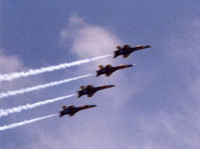Plane crashes at South Carolina air show
Six jets flew overhead in formation at an air show where a Navy Blue Angel pilot died in a crash the day before.

Smoke streamed behind one of the jets as it peeled away from the others to complete the "missing man formation," the traditional salute for a lost military aviator.
Sunday's air show at Marine Corps Air Station Beaufort began with a tribute to the Navy Blue Angel pilot whose aircraft plunged to the ground Saturday as the elite aviators were coming together for their final formation.
"The spirit of the pilot is in the arms of a loving God," said Rob Reider, a minister who was the announcer for the air show.
The Navy identified the pilot Sunday afternoon as Lt. Cmdr. Kevin J. Davis, 32, of Pittsfield, Massachusetts.
Witnesses said metal and plastic wreckage - some of it on fire - hit homes in a neighborhood located about 35 miles (56 kilometers) northwest of Hilton Head Island. William Winn, the county emergency management director, said several homes were damaged. Eight people on the ground suffered injuries that were not life threatening, said Capt. Sarah Kansteiner of Marine Corps Air Station Beaufort.
An investigation has begun, but Kansteiner said Sunday that she could not say anything about the cause of the crash.
The crash took place in the final minutes of Saturday's air show, said Lt. Cmdr. Anthony Walley, a Blue Angel pilot. The pilots were doing a maneuver which involved all six planes joining from behind the crowd to form a triangle, said Lt. Cmdr. Garrett D. Kasper, spokesman for the Blue Angels. One plane did not rejoin the formation.
A Navy statement said the pilot had been on the team for two years - and it was his first as a demonstration pilot.
"Our squadron and the entire U.S. Navy are grieving the loss of a great American, a great Naval officer and a great friend," Walley said.
Kasper said all possible causes of the crash are under investigation, and it could take at least three weeks for an official cause to be released.
John Sauls, who lives near the crash site, said the planes were banking back and forth before one disappeared and a plume of smoke shot up.
"It's one of those surreal moments when you go, 'No, I didn't just see what I saw,"' Sauls said.
The Blue Angels fly F/A-18 Hornets at high speeds in close formations, and are considered the Navy's elite. They don't wear the traditional G-suits that most jet pilots use to avoid blacking out during maneuvers. The suits inflate around the lower body to keep blood in the brain, but they could cause a pilot to bump the control stick - a potentially deadly move when flying inches from other planes.
Instead, Blue Angels manage G-forces by tensing their abdominal muscles.
The last Blue Angel fatality was in 1999, when a pilot and crewmate were killed while practicing for air shows at a base in Georgia.
Saturday's show was at the beginning of the team's flight season, and more than 100,000 people were expected to attend. The team, which is based at Pensacola Naval Air Station, recently celebrated its 60th anniversary.
The 2007 team has a new flight leader and two new pilots; Blue Angel pilots traditionally serve two-year rotations.
Kasper said the team would return to Florida on Sunday afternoon.
"We will regroup," he said.
Subscribe to Pravda.Ru Telegram channel, Facebook, RSS!


